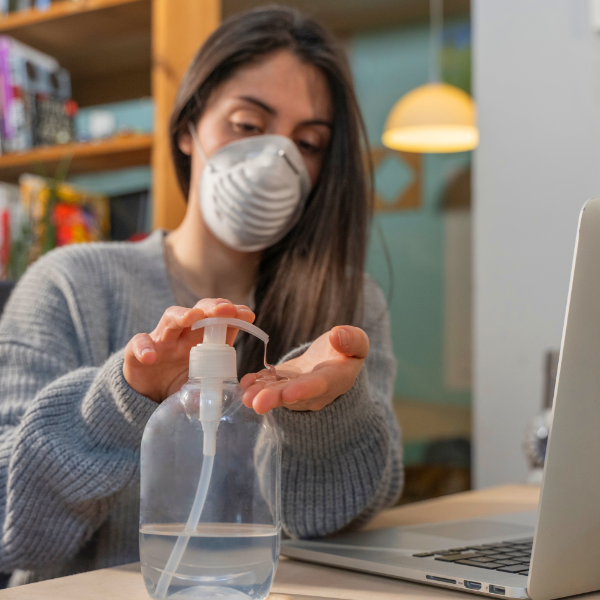What are the benefits of good hand hygiene?
Adopting hand hygiene is important for maintaining good personal hygiene, as it protects you against several infectious diseases, such as flu, common cold, etc.
While your hands may appear clean, they carry thousands of germs, bacteria, and viruses called pathogens. When a sick person coughs or sneezes, these pathogens are tossed into the air as respiratory droplets.
These droplets can easily land on the surface of your hands, and when you touch your mouth, eyes, or nose without adequately washing your hands, the pathogens in those droplets can enter your body and cause an infection.
Even though many of us know how to wash our hands, millions of people are still unfamiliar with the proper hand washing technique.
Proper technique for hand washing
Millions of people often overlook the importance of washing their hands. However, simply washing your hands with water alone is insufficient to effectively kill germs and bacteria.
To ensure you have eliminated 99.99% of germs from your hands, follow these proper hand washing advice and techniques regularly.
- Soak your hands with warm water.
- Apply antibacterial soap or antibacterial liquid hand wash on your hands.
- Rub your hands together briskly. Make sure you wash every part of your hands up to your wrists. Perform this action for at least 20 seconds.
- Rinse and dry your hands properly.
- Use a towel or tissue paper to turn off the faucet.
If you cannot wash your hands with soap and water, applying an antibacterial hand sanitizer that kills 99.99% of germs is a viable method to stop the germs from spreading.
Top benefits of good hand hygiene
It is impossible to keep your hands completely germ-free. But washing your hands frequently and adequately prevents germs from spreading and has several other benefits.
- Make your workplace healthy: Once a co-worker gets sick, it usually results in everyone else catching the same illness. Proper hand washing by all employees can significantly decrease the risk of the spread of diseases.
- Foodborne illnesses: Most foodborne diseases are caused by improper hand washing. This doesn’t only happen in public eateries. Therefore, you must stay vigilant about washing your hands before and after preparing and eating food at home.
- Bacteria’s survival rate: Bacteria can survive on skin, objects, and surfaces for several days. Do not expect them to die on your skin unless you wash your hands with antibacterial soap or antibacterial liquid hand wash.
- Eliminate antibiotic resistance: Proper hand washing helps prevent several stomach-related and respiratory diseases by over 30%. In addition, overuse of antibiotics can develop bacterial resistance, making illnesses more challenging to cure around the globe.
- Keeping kids healthier: Teaching children about hygiene and proper hand washing can decrease the likelihood of spreading diseases in daycare centers, schools, and homes.
- Prevents infections through the eyes, nose, and mouth: We touch our eyes, nose, and mouth several times an hour. This allows bacteria to enter our bodies and spread various infections. Frequent hand washing can drastically reduce the risk of infections.
Minimizing the risks
Here are further steps to protect yourself and your family from germs, bacteria, viruses, and infections.
- Use a tissue when you cough or sneeze. If tissue is unavailable, then blow into the crevice of your elbow.
- Make sure to clean and disinfect the surface areas and frequently touched objects in your home or offices. For example, use multi-surface cleaners for washroom and kitchen floors and other surfaces. To disinfect surfaces and objects, you must apply antiseptic solutions as often as possible.
